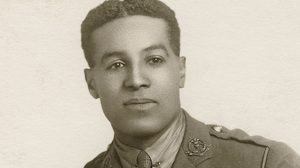BLACK HEROES FOUNDATION - PEOPLE
Walter Tull
Walter Daniel John Tull (28 April 1888 – 25 March 1918) was a pioneering Black British footballer and army officer who broke down racial barriers in early 20th century Britain. His remarkable life and achievements make him an important figure to highlight for Black History Month and beyond.
About Walter Tull
Walter Tull was born in Folkestone, Kent in 1888
Early Life:
His father, Daniel Tull, was from Barbados and his mother, Alice Palmer, was English. Tragically, Walter was orphaned at a young age – his mother died of breast cancer when he was just 7, and his father passed away from heart disease two years later. Walter and his brother Edward were sent to a Methodist orphanage in Bethnal Green, London. Despite this difficult start in life, Walter discovered a passion and talent for football during his time at the orphanage.
Football Career:
In 1908, at age 20, Tull signed for amateur team Clapton FC. His skills quickly drew attention and within a year he was signed by Tottenham Hotspur, becoming one of the first Black players in the top division of English football. However, he faced significant racial abuse from opposition fans. A 1909 match report noted the “cowardly attack” on Tull by a section of the crowd, believed to be the first time racial abuse was mentioned in a football report. Despite his talent, Tull only played 10 first-team games for Spurs before being dropped to the reserves and then transferred to Northampton Town in 1911. He thrived at Northampton, playing over 100 games for the club between 1911-1914. Tull was noted for his “clean” style of play and was described as a model for all footballers regardless of race.
Military Service:
When World War I broke out in 1914, Tull became the first Northampton player to enlist in the British Army, joining the Football Battalion of the Middlesex Regiment. He fought in the Battle of the Somme in 1916 and was commissioned as a second lieutenant in May 1917, becoming one of the first Black combat officers in the British Army. This was despite military regulations at the time forbidding “any negro or person of colour” from being an officer.Tull served on the Italian front in 1917-18 where he was praised for his “gallantry and coolness” while leading 26 men on a night raid into enemy territory. He returned to France in 1918 but was killed in action on March 25, 1918 during the Second Battle of the Somme. Tull was 29 years old. His body was never recovered.
Walter’s Legacy
Walter Tull’s life was one of remarkable achievements in the face of racial prejudice and personal adversity. As one of the first Black professional footballers in Britain and the first Black combat officer in the British Army, he broke down significant barriers. His conduct both on and off the field challenged racist attitudes of the time.
Today, Walter Tull is remembered through various memorials and initiatives:
- A statue stands outside Northampton Guildhall
- A road and pub near Northampton Town’s stadium are named after him
- Blue plaques mark his former homes in London and Northamptonshire
- He was featured on a Royal Mail stamp in 2018
- He was inducted into the English Football Hall of Fame in 2021
Tull’s biographer Phil Vasili summed up his legacy: “Through his actions, W.D.J. Tull ridiculed the barriers of ignorance that tried to deny people of colour equality with their contemporaries. His life stands testament to a determination to confront those people and those obstacles that sought to diminish him and the world in which he lived.”Walter Tull’s courage, talent and pioneering spirit in the face of racism and tragedy make him an inspirational figure in Black British history. His story deserves to be widely known and celebrated as an example of resilience and achievement against the odds.
Address List
- REGISTERED ADDRESS:
16 South End, Croydon, CR0 1DN - LOCATIONS: The Exchange, Somerset House, Strand, London, WC2R 0RN
- +44 07986 745486
- info@blackheroesfoundation.org
- Registered Charity: 1169616
- Privacy Policy
PLEASE DONATE
We need your support, please donate where you can.
Help us to make a difference. To be that bright light in the corner of a dark room, giving diversity a Voice.
